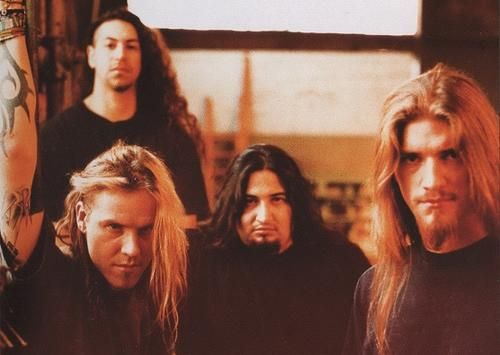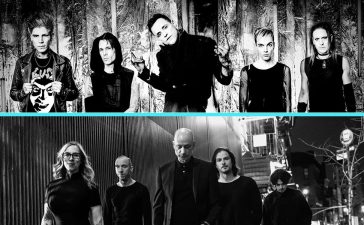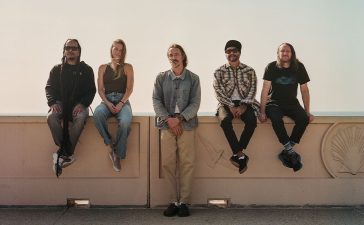One of the most influential metal records of the ’90s, Los Angeles band Fear Factory’s futuristic second full-length, Demanufacture, just turned 25. Blunt takes a historical look at this ground-breaking classic.
A city burning
Living in Los Angeles played a key role in the record’s genesis, as the members of Fear Factory watched chaos reign around them. That mix of tension, uncertainty and frustration is certainly channelled into the end result.
“From (the 1992 debut) Soul of a New Machine to by the time Demanufacture came out, in between all that time there was fires, floods, earthquakes, riots,” guitarist Dino Cazares told this writer in 2013. “It was just massive destruction in L.A. There was a point during the L.A. riots that we thought that L.A. was going down. The city was on fire, people’s businesses looted, everything was on fire, just crazy; people running in the streets, people shooting each other. It was complete anarchy and very apocalyptic.”
“We just thought, ‘okay, after all this destruction in L.A., something new’s coming’. Then we also tied it in with technology, because the world was changing. But in order for the world to change, something had to be broken down first, and that was Demanufacture. The theme of Demanufacture was breaking it down, and then something new was coming.”
Influence of sci-fi films
Also having a sizeable impact on the album’s concept – an apocalyptic tale depicting a futuristic world whereby a man leads the human resistance in a battle against the all-powerful machines – was the world of sci-fi films. The tracks ‘Zero Signal’ and ‘Pisschrist’ even both feature samples from Terminator 2.
“Dino and I had seen, while we were writing Soul of a New Machine and afterwards, we lived together for so long, we would watch all the same movies,” vocalist Burton C. Bell shared in 2013. “Like Apocalypse Now, The Terminator, Full Metal Jacket, RoboCop, Blade Runner…We started taking these words and titles from different movies and we would like sample some of the dialogue into our music.”
“We always wanted to write the soundtrack to an apocalyptic sci-fi movie that hadn’t yet been written. So that was what Demanufacture was going to be; like the soundtrack to a futuristic sci-fi, apocalyptic world. So we started (incorporating) that concept within the lyrics and the title.”
A range of musical influences
Soul of a New Machine was a polarising, yet crucial album within extreme music, meshing industrial touches and clean vocals with the death metal/grindcore style. A few years on, Demanufacture stripped away much of the death metal influence, but showcased Fear Factory morphing into a cold, taut and mechanical entity. The heavily syncopated delivery was heavier than a busload of Sumo wrestlers and soundscapes eerily atmospheric, while songs like ‘Self Bias Resistor’ and ‘Replica’ bristled with irresistibly catchy hooks.
“Me and Burton had so many different musical backgrounds,” Cazares says. “We liked so much different stuff, from gothic and industrial to alternative music –the early Nirvana, Sub Popera –all that stuff, Helmet too. Everything from Sepultura to death metal stuff; we kinda made the ultimate hybrid of everything that we liked, and created our own thing.
“Me and Burton wanted to create the fucking ultimate hybrid of industrial metal.”
The impact of technology
Following the underground success of Soul of a New Machine and 1993’s Fear Is the Mindkiller EP, whereby they reworked songs from their debut, with drummer Raymond Herrera and new bassist Christian Olde Wolbers also on board, Fear Factory turned their attention to the follow-up.
“It was Fear Is the Mindkiller that really helped us, like see the (big) picture,” the axeman explains. “When we did Soul of a New Machine we had 17 songs, and we put them all on the record. We trimmed a lot of the fat; we trimmed a lot of the unnecessary stuff that was on Soul of a New Machine, and our songwriting obviously got better.”
“When we started to go into the remix EP Fear Is the Mindkiller… That helped us a lot, because (mixer/keyboardist) Rhys Fulber had all the technology that me and Burt couldn’t afford. ‘Cause we were just pretty much in a one-bedroom apartment living with five dudes. Pretty much scrounging around, living in Hollywood, having minimum wage jobs and we just couldn’t really afford a lot of the keyboards, the computers and the technology stuff that Rhys Fulber had.
“So, bringing him into the picture during Fear Is the Mindkiller, he was able to bring that to Demanufacture. Me and Burt really wanted it; we wanted it from the beginning, but we couldn’t afford it. He definitely brought that into the studio and we were able to create Demanufacture.”
An innovative vocal approach
Legend has it Cazares overheard housemate Bell singing in the shower, and later wanted to incorporate his croon alongside the guttural death metal growls on Soul of a New Machine. When it came time for the next LP, the bipolar vocal approach was more refined. It would become a staple of their sound – and one imitated by countless other heavy bands, from melodic death metal and metalcore to nu-metal and beyond.
“Soul of a New Machine, when we were writing that record, that was pretty much the first time I was ever actually writing songs in a band where I was really trying to do something,” the singer says. “That was my first time really doing vocals for a band.
“When the first record came out, we started touring and we toured with all different types of bands. Touring with death metal bands, but also with a lot of hardcore bands – Sick Of It All, Madball. I realised my voice had developed based on what I was influenced and inspired by. So when the next record came out, I had more of a confidence about what I was writing about and what I was trying to achieve.
“When the clean vocals started coming out during Soul of a New Machine, it was like, ‘what?’ I almost did it as a joke, and Dino was like, ‘that style’s really cool, keep doing; keep doing it’. I was like, ‘okay’. It became a signature that, in the way where I would start singing when I would hear a melody in my head. Dino’s riffs are very heavy-duty, and I would hear a melody within the chorus that he was playing. And I would just try to sing the melody that I would hear in my head.”
Cazares recalls that not everyone immediately embraced this approach. “When Soul of a New Machine came out, people were talking shit because we had clean vocals on the record. It was different and it was definitely taking a chance. At the time it was all strictly death metal or fucking metal and you were one or the other. There was nothing in between, and here comes Fear Factory with melodic vocals on a death metal record. People loved it and people hated it.
“I find it ironic that a few years later, everybody was doing it in their music. A lot of people didn’t like it at first, but it grew on people; people started to love it. And then obviously from there, it started a whole new thing, and now in it’s in everything. There’s not a band right now that I can think of that hasn’t tried it, or hasn’t done it for a few songs, or hasn’t done a whole album, or created their own album with that same vocal style. I’ve heard other people try to claim it, but I know that we were before those bands,” he laughs.
“I should have trademarked it,” Bell adds with a chuckle.
Australia embraces Fear Factory
Since their first trek in 1993, Fear Factory has toured Australia numerous times, and with good reason – the group scored their first gold record anywhere in the world in Australia with Demanufacture, which was released via heavyweight label Roadrunner Records.
Their initial 1996 visit Down Under was cancelled after just one show due to an ill Bell. The ensuing riot at the Sydney venue garnered mainstream media coverage, as captured on the act’s Digital Connectivity DVD. “Australia’s just always been that country that always seems to be into what Fear Factory’s doing and our sound,” Cazares enthuses.
Many years later, the group performed Demanufacture in its entirety on several tours, doing so for the first time during a visit Down Under in 2013. “The people who have grown up with all this, who have grown up with Demanufacture, they were probably in high school when it came out,” Cazares says of the drawing power of nostalgia in metal.”They probably grew up, maybe got out of music, maybe had kids.
“Then suddenly they hear Fear Factory’s doing a Demanufacture tour, they want to re-live their youth. They want to come back and check out the show, like how they did when they were in high school. I also think there’s a new generation of kids who are going back, on the internet, and they’re discovering all those old bands that maybe their parents used to like, and they’re getting into that.”
Legacy
For many fans and critics, Demanufacture remains the definitive Fear Factory release. “I’m proud of it,” Bell says. “It’s a great record. A lot of bands have their record. Metallica has their Master of Puppets, Pantera’s Vulgar Display of Power, Slayer has Reign in Blood, and we’ve got our Demanufacture. It put them on the map as a ground-breaking band.”






